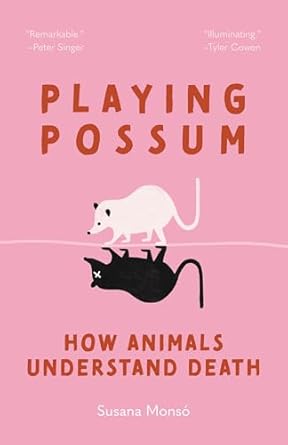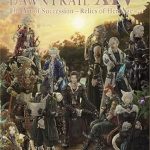Discover the profound insights of “Playing Possum: How Animals Understand Death” by Susana Monsó, an enlightening exploration of how various creatures perceive mortality. This captivating book reveals that the understanding of death is not solely a human experience, as Monsó shares compelling stories of animals—from ants mourning their own kind to elephants’ emotional connections with the deceased. Through a blend of humor and empathy, readers will learn how these diverse behaviors challenge our anthropocentric views and broaden our comprehension of life and death.
With a unique mix of philosophical insight and groundbreaking research in behavioral science, “Playing Possum” invites you to rethink your relationship with mortality. Monsó’s expertise in animal cognition and ethics provides a valuable perspective on the emotional responses of different species, illustrating that we are just another part of the intricate tapestry of life. This book offers both knowledge and reflection, making it a must-read for anyone interested in the intersection of nature and human understanding.
Playing Possum: How Animals Understand Death
Why This Book Stands Out?
- Unique Perspective on Mortality: Explores how various animal species perceive and react to death, challenging the notion that this understanding is exclusive to humans.
- Humor and Empathy: Combines light-hearted storytelling with deep emotional insight, making complex topics accessible and engaging.
- Rich Anecdotes: Features captivating stories of diverse species, from opossums to elephants, highlighting their distinct behaviors related to death.
- Interdisciplinary Approach: Blends insights from philosophy, behavioral science, and comparative psychology to provide a well-rounded exploration of animal cognition.
- Antidote to Anthropocentrism: Challenges human-centric biases, revealing that animals have their own diverse ways of understanding mortality.
- Insightful Author: Written by Susana Monsó, a leading expert in animal cognition and ethics, bringing credibility and depth to the discussion.
Personal Experience
Reading “Playing Possum: How Animals Understand Death” offers a profound opportunity to reflect on our own perceptions of mortality through the lens of the animal kingdom. As you delve into the stories of various creatures, you may find yourself resonating with their experiences, perhaps recalling moments in your life that echo the themes of loss and remembrance.
Here are some relatable insights and potential experiences that might arise as you explore this thought-provoking book:
- Connection to Nature: Many readers have a deep bond with animals, whether it’s a beloved pet or wildlife seen during a hike. The book invites you to consider how these connections shape your understanding of life and death.
- Personal Loss: Reflecting on your own experiences with grief, you might find solace in realizing that animals too express mourning in their own ways. This can provide a sense of shared humanity amid loss.
- Curiosity about Animal Behavior: The intriguing behaviors of animals in response to death may spark curiosity, prompting readers to observe their pets or local wildlife more closely and think about what they might understand about mortality.
- Philosophical Reflection: The book encourages readers to ponder the philosophical aspects of death. You may find yourself contemplating your beliefs about mortality and how they align or differ from those observed in animals.
- Empathy and Understanding: Monsó’s empathetic storytelling fosters a deeper appreciation for the emotional lives of animals. This might inspire you to advocate for animal welfare or engage more thoughtfully with the natural world.
In exploring the diverse ways animals understand death, “Playing Possum” not only broadens your perspective on mortality but also enriches your personal journey through life’s inevitable transitions. The stories shared within its pages could resonate deeply, reminding you that, in many ways, we are all navigating the same fundamental questions about existence and loss.
Who Should Read This Book?
Playing Possum: How Animals Understand Death is a thought-provoking read for a diverse audience. It appeals to anyone interested in the intersection of animal behavior, cognition, and the philosophical implications of mortality. Here are some specific groups who will find value in this book:
- Animal Lovers: Those who cherish animals will gain insights into their emotional lives and understanding of death, deepening their appreciation for the complexities of animal behavior.
- Students and Scholars: Academics studying biology, psychology, or philosophy will find a wealth of information and research that challenges anthropocentric views and enriches their understanding of animal cognition.
- Philosophers and Ethicists: Readers interested in existential questions regarding death and morality will appreciate the philosophical insights that challenge traditional human-centric narratives.
- Pet Owners: Individuals who have experienced the loss of a pet may find comfort and understanding in the shared emotional responses to death as explored through various animal behaviors.
- Conservationists: Those focused on animal welfare and conservation will benefit from understanding diverse animal perspectives on mortality, which can inform ethical considerations in wildlife management.
Playing Possum: How Animals Understand Death
Key Takeaways
Playing Possum offers profound insights into how animals understand death and what these perspectives can teach us about our own mortality. Here are the key takeaways from the book:
- Animal Perspectives on Death: The book explores various ways animals comprehend and react to death, revealing that this understanding is not exclusive to humans.
- Behavioral Evidence: Readers will learn about fascinating animal behaviors, such as ants attending their own funerals and elephants mourning their dead, showcasing the emotional complexity in the animal kingdom.
- Challenging Anthropocentrism: Monsó encourages readers to reconsider the human-centered view of death, advocating for an appreciation of diverse animal experiences related to mortality.
- Philosophical Insights: The book blends philosophical reflections with scientific research, prompting readers to think deeply about their own beliefs regarding death and dying.
- Empathy and Understanding: Through humor and empathy, the author fosters a greater emotional connection with the natural world and its inhabitants, inviting readers to reflect on their relationships with both life and death.
- Implications for Animal Ethics: The insights gained from animal behaviors regarding death can inform our ethical considerations and treatment of other species.
Final Thoughts
Playing Possum: How Animals Understand Death offers a profound and enlightening exploration of how various species perceive mortality. Susana Monsó masterfully blends humor, empathy, and scientific insight to challenge our anthropocentric views on death, revealing that the emotional responses to mortality are not exclusive to humans.
This book is not just for animal lovers; it’s a valuable resource for anyone interested in psychology, philosophy, and the connections between species. By sharing captivating stories and new research, Monsó invites readers to reconsider their relationship with death and the natural world.
- Uncovers unique animal behaviors related to death.
- Challenges anthropocentric biases in understanding mortality.
- Offers philosophical insights blended with behavioral science.
- Encourages empathy towards both human and animal experiences with death.
Don’t miss the chance to deepen your understanding of life and death through the eyes of other species. Purchase Playing Possum today and discover the fascinating ways animals navigate the complexities of mortality.





